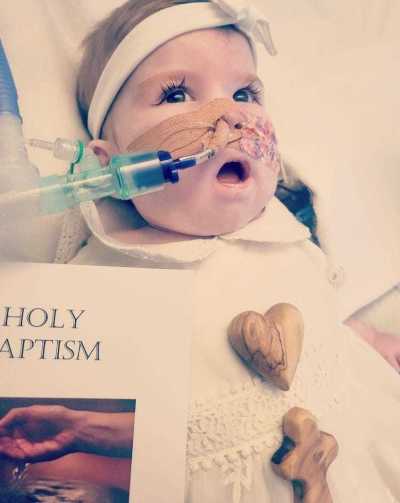Judge denies 8-month-old Indi Gregory right to further treatment in Italy

A United Kingdom court has blocked the transfer of 8-month-old Indi Gregory, who is on life support fighting a rare mitochondrial disease, to Italy for medical treatment. The baby girl is under treatment at the Queen's Medical Centre in Nottingham.
Justice Robert Peel of the High Court ruled Thursday that it would be in the child's best interest to stay in the U.K., the rights group Christian Concern reports, adding that the Italian government had offered to fund specialized treatment for the child at the Bambino Gesù Paediatric Hospital in Rome.
The court's judgment coincided with the expiration of a legal stay preventing the removal of life support, which is now extended until Saturday afternoon, noted the group, whose legal arm, Christian Legal Centre, is supporting the baby's family.
Indi's father, Dean Gregory, is challenging the ruling, having arranged for an immediate appeal. At an urgent hearing earlier this week, his legal representatives contended that the child's right under the European Convention of Human Rights was at stake.
An Air Ambulance service ready to coordinate with Queen's Medical Centre for the transfer requires a risk assessment from the treating clinicians, who have denied cooperation. The hospital leaders assert that further treatment is not in Indi Gregory's interest despite new medical evidence suggesting otherwise.
Dean Gregory described the ruling as "sickening" and continues to make efforts to give his daughter a chance at life.
"We have been given a real chance by the Bambino Gesù Paediatric Hospital, which we want to take for our daughter," he said.
The Nottingham University Hospitals NHS Trust believes discontinuing life support is in the baby's "best interests."
Andrea Williams, chief executive of the Christian Legal Centre, questioned the court's decision to deny such an opportunity.
“There is a hospital prepared to care for Indi in Rome. Indi’s parents desire to give her every chance they can. Why would anyone try to stop this happening for them and for her?" Williams asked. “To deny them this opportunity is unimaginable, unjust and perverse."
The trust's resistance came into the spotlight when it threatened to proceed with the withdrawal of life support despite the pending legal hearing and the Italian treatment offer. The family's lawyers see the trust's refusal as a possible breach of Gregory's rights.
The Christian Legal Centre contends that medical opinions from two experts suggest the baby's breathing issues are caused by a treatable heart condition, contrary to the trust's claim of brain damage from the mitochondrial disease. Experts suggest a "right ventricular outflow tract stent" could significantly improve the child's ability to breathe without ventilation.
The Gregorys received a letter from Tiziano Onesti, president of the Italian hospital, confirming readiness to accept Indi Gregory and outlining a treatment plan including life-sustaining measures and palliative care.
Last month, the parents were informed with only 48 hours' notice of a legal hearing determining Gregory's fate.
The family had been pressured to abort their child multiple times before her birth, Gregory said earlier.
Another family in the U.K. went through what the Gregorys are going through. The late 19-year-old Sudiksha Thirumalesh also suffered from a rare genetic mitochondrial disease and wanted to seek experimental treatment in Canada but was denied the opportunity by an NHS Trust. She died on Sept. 12.
Thirumalesh's family is struggling with a legal muzzle even after the death of their daughter, whose identity and case details were suppressed for over a year. Court orders recently only partially lifted the veil but maintained restrictions.
A judge last month identified the University Hospitals Birmingham NHS Foundation Trust as the healthcare body responsible for the Thirumalesh's care, Christian Concern announced.
Before her death, she could not share her story publicly or raise funds for experimental treatment abroad because of a gag order that shielded the identities of the hospital and NHS Trust.
The family said Thirumalesh had full mental capacity until her death, disputing a judgment from High Court Justice Jennifer Roberts that she didn't have the capacity to make life-or-death decisions after NHS lawyers argued that she was "delusional."



























